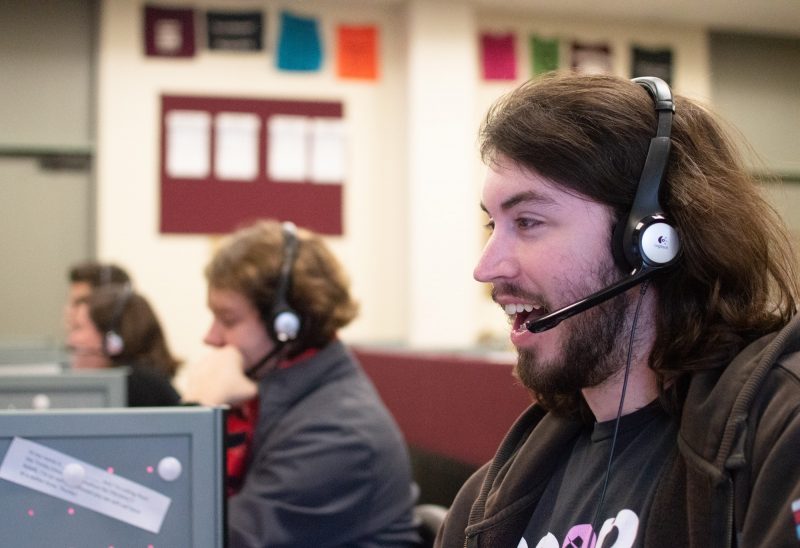Have you, family members or alumni friends ever picked up the phone to be greeted by a voice on the other end of the line asking for Trinity donations? That was a Phonathon caller — a student worker in one of Trinity’s most important outreach programs that raises money for the university.
Jim Stryker, associate director of Annual Giving Outreach and Engagement, explained the brief history of how Phonathon came to be and settled onto campus.
“It started in 1985 as a two-week volunteer effort. All types of groups would volunteer for nights during the two-week period — I think they used Waxahachie for a lot of it. And so they’d come in, and there’d be prizes for the top five callers. That was for the first 20 years, from ’85 to 2005, [and that’s] when it became a two-semester calling program paying students,” Stryker said.
Syne Barr, senior and supervisor for Phonathon, said that supervisors arrive 30 minutes before to go over talking points, updates to the calling system and program statistics. The callers then arrive at 6 p.m. to start their shifts, which go until 9 p.m. They do not work Saturdays or Sundays.
Victoria Brown, junior and supervisor, outlined the job’s details.
“A typical shift has us heading up to the second floor of Mabee, taking our seats and going over a few talking points presented by the supervisors,” Brown said. “After that, we dial.”
“The rest of the shift, supervisors walk around monitoring calls and answering questions,” Barr said. “Our main job is to keep people motivated and maintain a good atmosphere in the room.”
Brown said that shifts can look different every day — some days workers may have great conversations with alumni, and on other days, workers will get answering machine after answering machine. Either way, callers have to keep good energy and attitude to make sure that the conversations leave both people feeling satisfied.
“More than just soliciting funds, it is about [the callers] having really good conversations with alums and connecting them back to Trinity. Students have the best idea of what’s happening on campus and are able to talk and share experiences with alum,” Stryker said. “We encourage them to get gifts, but we would much rather them have good conversations and good experiences.”
According to Stryker, a majority of the money raised by Phonathon feeds into the Trinity Fund be put to immediate use towards the university. The money also goes toward scholarships — an integral part of students’ paths at Trinity — or another cause based on what the person being called wants to donate to.
“About 90 percent of the dollars given to Phonathon go to the Trinity Fund, one of our big scholarship pools, and about 10 percent of people say, ‘Oh, I want it to go to football,’ or ‘chemistry,’ and they can decide where they want to give,” Stryker said.
As far as how much money Trinity University manages to raise through Phonathon, the amount is significant. Stryker said that the average is about $250,000 to $300,000 every year.
“Every year we have a goal to raise; last year, it was over $200,000, which we did end up reaching and passing,” Brown said. “This year, it’s still in that $200,000-plus ballpark and we hope to exceed that again!”
Ultimately, both Brown and Barr reinforced the idea that connections with the alumni are a priority for anyone interested in working for Phonathon and connecting to the Trinity community — not only in San Antonio but all over the nation.
“[As a caller], my favorite part was getting to connect with people that have previously been in the same shoes as me,” Barr said. “As a supervisor, I enjoy hearing the callers connect with alumni and turn to me for advice.”
“Not only [do] alumni hear about the current Trinity experience first-hand, but [Phonathon] allows students to learn from alumni,” Brown said. “Our callers are able to receive advice from alumni of all types of backgrounds and hear about the many ways in which a Trinity degree can be used.”







